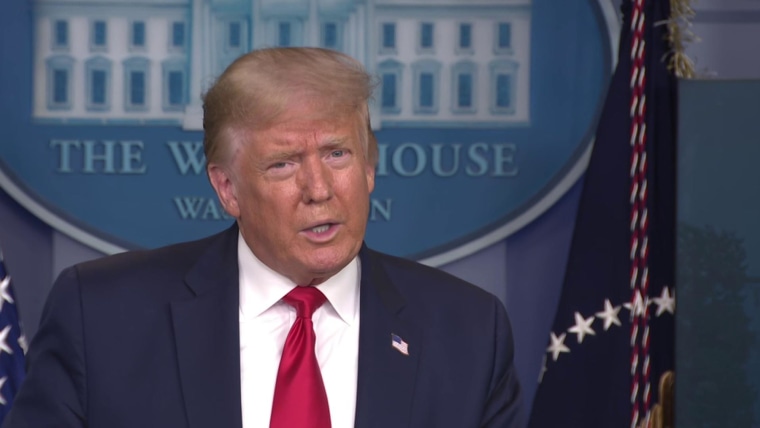Numerous states have received letters from the U.S. Postal Service in recent days warning them that the agency that oversees mail in the United States will not be able to fulfill requests for mail-in ballots.
The USPS said that there is not enough time for the ballots to be requested, completed and returned before the Nov. 3 presidential election, a startling development as many states have expanded mail-in voting because of the pandemic.
NBC News reached out to 28 states across the country to see whether they have received a USPS letter warning of issues surrounding mail-in ballots. Fifteen states — Alabama, Arkansas, Arizona, California, Colorado, Connecticut, Florida, Massachusetts, Maine, Michigan, Minnesota, North Carolina, Pennsylvania, Texas, and West Virginia — shared the letters they were sent by the federal agency about the delay. Vermont and Wisconsin said they did not receive a warning from USPS.
The letters, sent by the postal service’s general counsel Thomas Marshall, say that states’ election “deadlines for requesting and casting mail-in ballots are incongruous with the Postal Service’s delivery standards. This mismatch creates a risk that ballots requested near the deadline under state law will not be returned by mail in times to be counted under your laws as we understand them.”
The implication is serious, as the ballots of tens of millions of American voters eligible to vote by mail could be discarded because of delays in mail delivery. It also comes as the agency, founded by the U.S. Constitution, undergoes sweeping changes organizationally at the behest of the Trump administration and faces a grim financial outlook.
The USPS declined to say how many states were sent the letter, but a spokeswoman for the agency insisted that the Postal Service regularly reaches out to state officials during an election cycle “regarding our mailing requirements, delivery standards and best practices for enabling voting by mail,” especially as states see a surge in voting by mail due to COVID-19.
“Some states have reported Election Mail volumes that are 10 times higher than any previous year,” Marti Johnson, an agency spokeswoman, said. “The Postal Service is well prepared and has ample capacity to deliver America’s election mail. However, the increases in volume and the effect of when volumes were mailed in the primary elections presented a need to ensure the Postal Service’s recommendations were reemphasized to elections officials.”
Pennsylvania is now fighting a legal battle in its state Supreme Court to allow it to count mailed ballots up to three days after election day.
Download the NBC News app for breaking news and politics
The warnings of an impending delay come, however, as the federal agency appears to grow increasingly politicized by the Trump administration. Many fear that the White House is exerting its influence and holding back critical funding to delay mail-in voting and further long-expressed desires to privatize American mail delivery.
Congress is currently debating over $25 billion that would go to the Postal Service, and President Trump previously said he would veto a bill that included funding for the agency. He has backtracked on that issue in recent days, but said Friday that he would only sign a bill that included money for the Postal Service “if they gave us what we want. And it’s not what I want — it’s what the American people want.”
Trump has expressed numerous times without evidence that mail-in voting will lead to voter fraud, and he has threatened to hold USPS funding because of his unsupported claims. Meanwhile, the White House helped to put in place Trump ally Louis DeJoy as the country 75th postmaster general in May.
A major Republican donor, DeJoy has introduced a number of policy changes that appear to have slowed the delivery of mail. For personnel, he banned overtime and additional trips made by carriers to deliver mail on time.
He is also decommissioning 671 of its letter sorting machines, according to an internal document obtained by NBC News. These major apparatuses, located in USPS buildings across the country, can individually sort 35,000 letters per hour. Their absence would hinder the delivery of election-related post, though postal workers warn that the cuts to overtime and staffing are a greater problem.
David Partenhemier, a USPS spokesman, in an email to NBC News characterized the removal of the hundreds of machines as: “Normal business adjustments!” He added that the agency often moves equipment to match fluctuating volume.
“Package volume is up, but mail volume continues to decline,” he wrote. “Adapting our processing infrastructure to the current volumes will ensure more efficient, cost effective operations and better service for our customers.”
The Postal Service began to reach out to states via the mail in March and May regarding mail-in voting delays “in addition to numerous meetings and phone calls made between the Postal Service and election officials.” That would appear to indicate that these warnings came prior to DeJoy’s appointment by the USPS Board of Governors.
Nevertheless, DeJoy has become a target of ire, especially among Democrats, as many believe that he is helping the Trump administration politicize the agency.
House Speaker Nancy Pelosi and Senate Minority Leader Chuck Schumer said in a statement on Friday that the president needs to “immediately cease his assault on the Postal Service.”
“The Postal Service provides services that are critical to the lives and livelihoods of the American people: ensuring that seniors receive their medicines, workers receive paychecks, taxpayers receive refunds and voters receive absentee ballots,” the two Democratic leaders said. “Postmaster General DeJoy must quickly reverse his operational changes that have led to delays and service reductions for too many Americans and threaten to undermine our democracy.”
Kevin Collier contributed.














